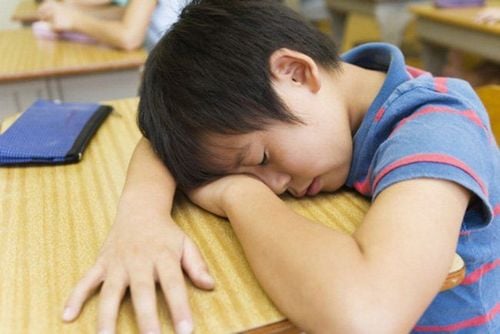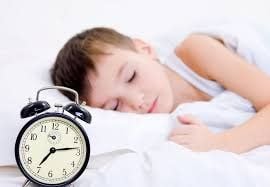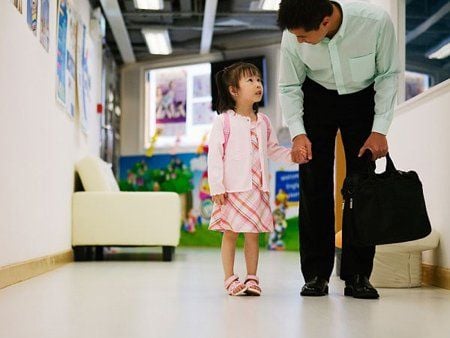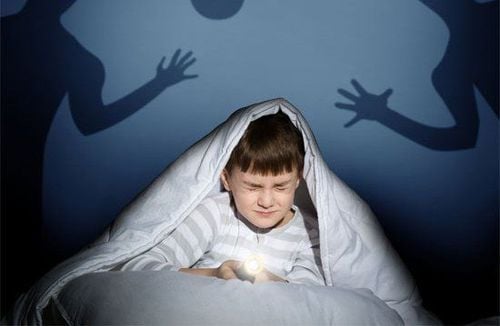This is an automatically translated article.
We all know that good sleep habits are important for children. But parents' busy work schedules, after-school activities, and homework can all cut down on family time on school evenings and can have a big impact on how long a child sleeps. young.In fact, the time spent together in so many households starts around 6 or 7 or even later in the evening, it's hard to set an early bedtime. And since experts say that school-age children most likely need about 9 to 11 hours of sleep - that means kids need to go to bed at 8 or 9 p.m., depending on what time they need to wake up. So what can you do to make sure your child gets enough sleep to function at his best? And help school-age children establish healthy sleep habits. Therefore, in this article we will provide a few ways you can help your child get into this habit.
1. Typical sleep patterns of school-age children
Between the ages of 5 and 8, children typically need 10 to 12 hours of sleep each night. Most kids this age go to bed between 7:30 and 9 p.m. and wake up from 6:30 to 8 a.m. When children start school, especially those who are studying half a day and are transferred to full day school, parents will feel that children really need more sleep and are ready to sleep earlier than before. attend.
Besides, when children are not guaranteed enough sleep, it can greatly affect children's behavior during the day and school results due to lack of sleep, making children not focus on lessons and learning progress. children also decreased.
Regular lack of sleep also leads to a number of health problems for children such as children becoming irritable, difficult to concentrate, high blood pressure, obesity, headaches and worse, depression. Children who get enough sleep and get good quality sleep have stronger immune systems and better performance in learning, behaviour, memory and mental health.

Trẻ ngủ không đủ giấc sẽ ảnh hưởng đến kết quả học tập
2. What to do to help children form good sleep habits?
When children can't sleep because they find it difficult to sleep, do not want to sleep, ... then parents can refer to a few ways below to help children fall asleep more easily:Fix the child's bedtime : Parents should train their children to go to bed at a certain time every night, including weekends. The ideal time for babies to go to bed is between 7:30 and 8:30. This will form the child's subconscious biological clock and make it easier for the child to fall asleep quickly at bedtime. Besides, children no longer feel uncomfortable when they feel they have to go to bed early or are tired and lack of sleep when they feel they go to bed late. Keep a consistent bedtime routine: Bedtime rituals aren't just for babies, in older kids who may be more independent. Children can prepare bedding by themselves, or can read stories, listen to music, even take a bath... before going to bed, these habits can help children feel more comfortable and comfortable after a day. Tired and busy school day. Parents need to ensure that the child has a quiet space before going to bed, to avoid making noise that will startle or wake the child, which will make it more difficult for the child to fall asleep. Parents should limit children watching movies before going to bed, or do not leave TV in the bedroom, this does not help children sleep better, but causes children to have sleep disturbances, leading to more nightmares and problems. other sleep problems. The whole bedtime routine usually lasts from 30 to 45 minutes, if parents feel that the child takes a long time for this, they should adjust to cut it shorter. For example, instead of reading a story that lasts more than an hour, parents can replace it with shorter stories, one story a day that will make children more interested. Children should not be told stories consisting of many chapters related to each other like the Harry Potter series, having to think about the next possible details will make the child toss and turn, unable to sleep.
Besides, parents should also make sure to create a habit for children to sleep in one direction. For example, when parents call their child upstairs for a bath, don't let the child go back downstairs to say good night to the family pet after the bath is over. Instead, let your child finish his bath, go to his bedroom, put on his pajamas, and tell stories that lead him to sleep.
Parents should also give children time to put aside worries and think about what happened that day. In fact, bedtime can be seen as an opportunity for children to bond with their parents, parents can talk to their children, listen to children tell stories at school or make new friends, ... this will help the family be connected, closer together.
Some parents are too busy at work, can't take the time to take care of and listen to their children's stories, ... causing children to bring worries to sleep, even children can't sleep, gradually Children will gradually close themselves and create a gap between generations in the family. Instead of letting that happen, sometimes parents just need to ask their children about the best and worst moments that happened to them today, simple questions that make children feel, feel close as well as create the door for children's increasingly independent life.
Let children be active during the day, parents should make sure children have interesting and varied activities during the day, including physical activity and fresh air. Children should be restricted from sitting in one place and using smartphones or televisions, computers, etc., especially at night. To prevent children's sleep disruption, parents should turn off such devices at least 1 hour before bedtime.
A safe bedroom and home environment will also help children feel comfortable and secure when sleeping. Parents should also note to reduce the brightness of the lights before going to bed and check the temperature in the child's room, do not let the toys pile up on the child's bed because this is a place to sleep, it is necessary to be spacious and free of objects. interfere with the baby's sleep. In addition, children can hug bears and small dolls to feel safe and warm before going to sleep.
3. Nightmares in Children's Dreams
Nightmares that embrace the fear of going to bed are common in school-age children. Especially in children who are more aware of the world around them, or children with rich imaginations, self-suggestions of fear about animals under the bed or some "ghosts", .. . or some other "real" danger. Therefore, it is essential for parents to talk to children about their concerns.
Besides, parents can reassure their children by comforting and encouraging them that their parents are always there, nothing will happen,... and discuss with the child how to deal with the problem. that fear. At this point, books or personal stories about how you deal with those fears can be a great help. However, if a child's bad dreams or night terrors persist for a long time, parents should find out the sources of anxiety in their child's daily life and talk to them about how to overcome them. For example, when a child has concerns about school performance or has a conflict with classmates that can lead to trouble sleeping, parents should find the cause and help the child solve the problem better.
When children get older, they refuse to go to bed "early", this time, children need more time to study, to play or to watch the movie they like,... so going to bed early will become difficult. bear with children. Parents should also not be irritable and force their children to go to sleep, but should talk to them gently, talk to them about how important sleep is and how they will feel better when they rest after a good night's sleep.
Although the most important thing is still to let the child talk about his problem, parents should focus on that issue and put the child to sleep by reading a story to the child, holding the child in his lap or playing some music. gently after turning off the light.

Cần trấn an trẻ khi gặp những cơn ác mộng
Please dial HOTLINE for more information or register for an appointment HERE. Download MyVinmec app to make appointments faster and to manage your bookings easily.
Articles refer to sources: babycenter.com, healthychildren.org












